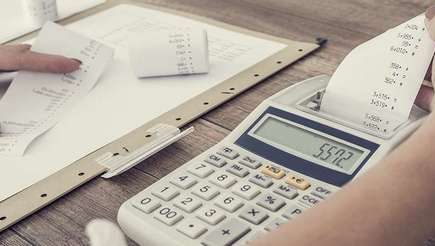When you run a small business, every penny counts towards your bottom line. Getting more clients is the best way to make cash, but saving money is another way to keep your profits looking healthy. In the tough economic times ahead, it makes sense to use every option available to save on costs and put money back into your business.
One easy way to save more money is to make sure you’re claiming all of your allowable expenses – that way you’re not paying more tax than you have to.
What are allowable expenses?
If you're a self-employed cleaner, you might need to complete a Self-Assessment return and pay tax on the money you earn but there are several expenses you can claim against your income profit which will reduce the amount of tax you owe. HMRC lets you subtract the costs that have been incurred specifically due to the running of your business from your business' profit. However, only certain things can be put down as an expense.
It's important to understand what's allowed and what's not so that you don’t become an accidental tax avoidance target of HMRC. That's why it's a good idea to stay organised and keep a record of the invoices entering and leaving your business.
Examples of allowable expenses for cleaners
HMRC has full guidance on what counts as an allowable expense available on the government website, but we’ll walk you through a few examples of business costs that could be claimed as an allowable expense if you run a cleaning company:
Cleaning tools and equipment
Any of the small and consumable products you use for clients can be claimed including sponges and scourers, paper towels, disinfectant sprays, tile cleaning sprays, and more. Your small cleaning equipment such as vacuums, wet floor signs, aprons, and buckets can be claimed as well. If any of these equipment pieces start to show some wear and tear, repairing, replacing or upgrading them are costs that can be included on your tax returns as well.
Insurance
If you run a cleaning business, you know your clients are placing you in a privileged position of trust, and you treat their property and treasured things with the utmost care. However, accidents can still happen especially when working with chemicals and wet floors like you do in cleaning! Public liability insurance can help protect you against third-party injury or damage and it’s able to be written off as an allowable expense. In fact, any insurance policy you take out, whether it’s van insurance, employer’s liability or business equipment insurance, can be claimed as an allowable expense.
Car expenses and mileage
In addition to your van insurance, there’s several other allowable expenses that you can claim which are related to business vehicle usage. This can include business travel and mileage, parking fees, fuel, repairs and maintenance as long as all of those costs are incurred for the purpose of doing business. If you get any fines or tickets while driving, please be aware that you will not be able to claim any allowable expenses on these.
Advertising fees
In order to be successful a business will have to spend some money on promotion. Any time that promotion costs you money, you can claim it as an allowable expense. If you spend money on flyers that you’ll deliver door to door or hang in local cafes, libraries, leisure centres or other community hubs, you’ll be able to claim back that expense. Anything from advertising online to placing signage at the properties of existing clients could be claimed as an allowable expense.
Work & safety clothing
While everyday clothing or even business clothing such as suits cannot be claimed as an allowable expense, work and safety clothing can. This means expenses on rubber gloves, safety goggles or any other protective clothing would all count as allowable expenses as they're protective clothes needed to complete the job. Clothing that could be part of an 'everyday wardrobe' will not be covered by HMRC so don't try to claim things that aren't specifically for work.
Finances
Certain expenses related to your business finances can be claimed against expenses as well such as bank charges for opening and maintaining a business or interest on loans for starting the business. If keeping track of all these allowable expenses is intimidating for you, you can even claim back taxes for the costs spent on hiring an accountant to help you.
Office Items
It's unlikely that you'll be claiming a lot on office items as a cleaner, considering your work largely takes place in other people's homes, however you are able to claim for any office items you do use such as a business phone, postage or stationery.
If you regularly conduct business from your own home, you can claim a portion of your electricity, broadband and other bills as an allowable expense but you'll need to work out what proportion of this is used for home and what proportion is used for work.
Disallowable expenses for cleaners (don't claim these!)
While a lot of your expenses can be covered under allowable expenses, unfortunately there are some things that definitely can’t be claimed. While this list isn’t exhaustive, here’s a few things you won’t be able to list as an allowable expense and will still have to pay the taxes on:
- Parking fines and penalties
- Tax penalties and late payment interest
- Meals, unless in special circumstances
- Client entertainment
- Everyday clothing or business suits
- Your pension costs
- Your salary
- Your Life insurance
How to claim allowable expenses
When you add up all of your allowable expenses for the tax year, you put the total amount on your Self-Assessment tax return. At this stage, you don’t need to include receipts, but it’s still important to keep accurate records. HMRC can ask you for evidence at a later date and you might be fined for submitting incorrect information.
You should keep receipts for six years after you've filed your tax return. HMRC can investigate your landlord finances at any time within this period, so it's better to be safe than sorry. If you’re struggling to stay on top of things you could invest in accounting software to help you track your finances – there are plenty of inexpensive and free options to choose from.
Keep organised
You might want to create an expenses spreadsheet which you can update and amend throughout the year. It may seem like a hassle in the moment, but you’ll reap the benefits of a well-ordered catalogue of your business receipts and invoices come the end of the tax year.
To stay organised, set aside a specific time each week to make a note of the business expenses that you're liable to receive tax relief for – you may want to get familiar with spreadsheets as a way of tracking everything. By doing a bit of admin every week, it keeps claiming allowable expenses from being a daunting task during tax season. It also ensures that your expenses are more accurate because you’re taking notes as you go along when everything is fresh in your mind.
Not only will this make the claims process much simpler but if any of your claims are queried, you’ll have proof that they’re legitimate – especially handy as HMRC can request proof of expenses up to six years after they’re claimed.
Simplified allowable expenses for cleaners
If you're frequently on the go to different client's homes, you may want to take a look at simplified expenses. Simplified expenses are a way of calculating certain allowable expenses using flat rates, rather than working out individual costs. You can find out the flat rates by using the government’s simplified expenses checker here. Simplified expenses can be used by self-employed people and business partnerships - they can’t be used by limited companies or business partnerships involving a limited company.
When it comes to simplified expenses as a cleaner, the most relevant flat rate is likely for your vehicle costs. But you need to remember that you can’t claim on regular travel between your home and place for work. You can claim for travelling to clients homes – though there is debate on whether or not a client who has a regular slot with you at the same location, day, and time is considered a place of work given its consistency. Consult a tax professional to be sure about this point! Travel to ad-hoc or irregular cleaning jobs should be able to claimed as an allowable expense though.
Don’t pay more tax than you have to
Claiming allowable expenses for your cleaning company isn’t about avoiding paying tax, it’s about making sure you’re paying what’s fair. As the cost of doing business gets higher and higher, claiming these costs back is a great way to save some money.
All links are checked and valid at time of publishing, 11 November 2022.






